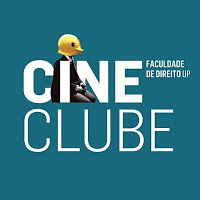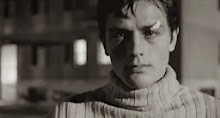A encerrar a sua programação regular do 2.º semestre, o Cineclube FDUP apresenta, esta quinta-feira, naquela que é uma estreia no panorama cineclubista universitário do Porto, o realizador brasileiro GLAUBER ROCHA, com o aclamado "DEUS E O DIABO NA TERRA DO SOL" (1964), marco incontornável do chamado "Cinema Novo" brasileiro.
Filme fortemente político, reflectindo sobre a realidade social do Brasil dos anos 60, país imerso, à semelhança de Portugal, numa ditadura de direita, melhor seguimento não poderia constituir para as comemorações de 25 de Abril.
É já esta quinta-feira, às 18h15, na sala 1.01 - entrada livre e universal, sem restrições constitucionalmente autorizadas.
Sobre o filme:
"Shown at Cannes in 1964, Deus e o Diabo , together with Nelson Pereira dos Santos' Vidas Secas (Barren Lives) , introduced the international viewing public to the Cinema Novo, an artistic movement which strove, in the name of a political conscience, for a Brazilian identity and ethos. Enthusiastically received at Cannes— Georges Sadoul considered its style "revolutionary"— Deus e o Diabo genuinely lived up to the Cinema Novo's motto: "an idea in the head and a camera in the hand". Glauber Rocha, the Cinema Novo's most controversial figure, was the author of bombastic writings, such as the manifesto "The Aesthetics of Hunger," (presented in Genova in January 1965 during the Reseña del Cine Latinoamericano), in which he stated that "our originality is our hunger." And the concept of hunger—both literally and in reference to a hunger for social justice—is central to Deus e o Diabo na Terra do Sol. (...) A true exponent of the author's cinema style, with the strong political and social concern of the 1960s, Glauber Rocha's restlessness is felt through the impatient use of the hand-held camera, the originality of his framings, and the rhythm of the editing. The use of panoramics, travellings, zooms, and close-ups produces a tense and eloquent narrative, punctuated by philosophical interjections—"fate is greater than we are;" "we have nothing to take but our fate," and "man learns nothing in peace, he needs to fight to live and he needs to die to win."
Thirty years after it was made, Deus e o Diabo retains its contesting tone and the revolutionary personality of Glauber Rocha. At the age of 25, with a camera in his hand and a whirlwind of ideas in his head, Glauber Rocha created one of the most important Brazilian films through the undeniable strength, originality, and beauty of this furious fable about good and evil".









Sem comentários:
Enviar um comentário